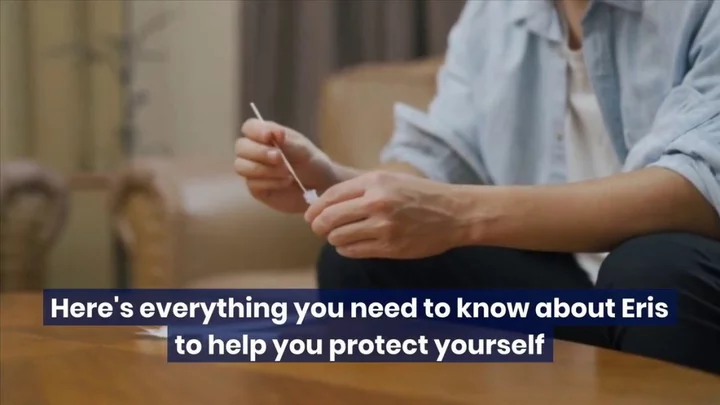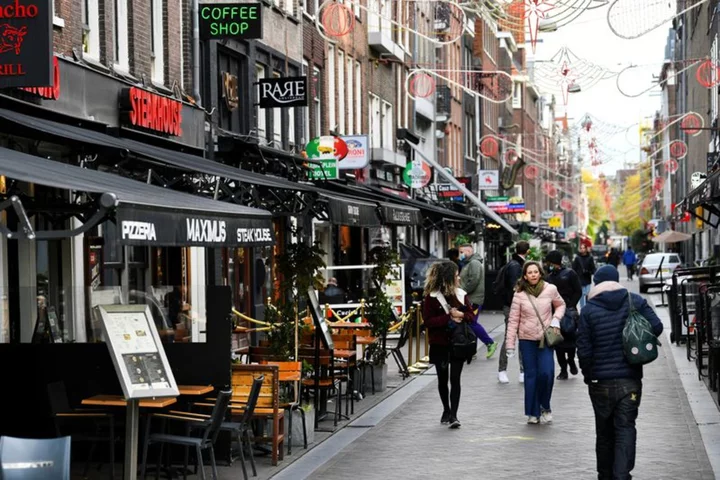
World Cup: Matildas score TV rating record in semi-final loss to England
Australia's semi-final against England drew the highest TV viewership recorded nationally in decades.
1970-01-01 08:00

Gotthard: World's longest rail tunnel shut for months after freight crash
National Swiss rail operator SBB said a derailed freight train caused severe damage to tracks.
1970-01-01 08:00

What can you actually do to help prevent cancer, as 12% believe coffee is carcinogenic?
A new poll has found that 12% of people still believe that drinking coffee is carcinogenic. The new poll – conducted by the World Cancer Research Fund (WCRF), which surveyed 2,092 adults via YouGov – looked into the different ways people live, and whether it impacts their risk of cancer. The research found that 86% of people believed smoking increased the risk of cancer, while 60% said that being overweight could do the same. 47% thought being physically inactive can be detrimental, and 59% believed a poor diet can up the odds. Almost 59% said alcohol can increase a person’s risk and 55% said processed meat could be a risk factor. WCRF launched its poll to highlight its free eight-week interactive programme Activ8, to provide people with tips on making healthier food and drink choices, and finding different ways to be more active. Cancer Research UK wrote on their website that “not all cancers can be prevented, but there are things you can do to reduce your risk”. A person’s risk of cancer depends on many different things, for example, someone’s genes or age. But according to the charity, four in 10 UK cancer cases could be prevented. “The world around us doesn’t always make it easy to be healthy – but small changes to your daily routine can add up.“ The WCRF agreed and has said that around 40% of cancer cases could be prevented through factors including eating a healthy diet, keeping physically active, maintaining a healthy weight, not smoking and being safe in the sun. Dr Helen Croker, assistant director of research and policy at the WCRF, said: “These poll results show that many people aren’t aware of some of the steps they can take to help protect themselves from cancer. “For example, it’s interesting to see that 12% of Brits believe drinking coffee increases cancer risk, when in fact we have strong evidence that it reduces the risk of liver and womb cancers, and some evidence that drinking coffee could decrease the risk of other cancers, including mouth and skin. “For cancer prevention, there’s no reason for most people not to drink coffee, but for those who do, we recommend not adding sugar or other sweeteners, and drinking it in moderation.” Read More Charity boss speaks out over ‘traumatic’ encounter with royal aide Ukraine war’s heaviest fight rages in east - follow live A-Level results: How to be the emotional support your teen really needs These are the cheapest school uniforms on the high street – according to Which? Half of anxiety and depression cases in new and expectant mums are missed: 7 signs a new mum needs help
1970-01-01 08:00

North Korea: Taekwondo athletes believed headed to Kazakhstan
It will mark the first overseas appearance of North Korean athletes since the pandemic.
1970-01-01 08:00

Use Blogify's AI-Powered Service to Create Blogs From Audio, Video for $50
While ChatGPT may have taken the news media by storm, it's far from the only
1970-01-01 08:00

Man's legs turn purple in rare Covid complication
The effects of long Covid are still being uncovered by experts, and now doctors have been studying a rare complication that saw a man’s legs turn purple. A new research paper has been released which looks into the case of a 33-year-old man who had been infected with Covid 18 months earlier and experienced difficulties when standing up. His legs would turn purple when he did so, as well as tingling and itching, but things would return to normal when he lay down. The odd condition was diagnosed as POTS dysautonomia. This was determined after his pulse was found to rise to 127 beats per minute when standing, as well as feeling shaky and unsteady on his feet. The paper leads on from previous studies, which detected POTS in 20 people after they developed a Covid-19 infection. According to the new study published in The Lancet, there is "evidence is growing of a link between long Covid and POTS dysautonomia”. The paper’s co-author Dr Manoj Sivan said in a statement: "This was a striking case of acrocyanosis in a patient who had not experienced it before his Covid-19 infection. "Patients experiencing this may not be aware that it can be a symptom of long Covid and dysautonomia and may feel concerned about what they are seeing. Similarly, clinicians may not be aware of the link between acrocyanosis and long Covid." Dr Sivan added: "We need to ensure that there is more awareness of dysautonomia in long Covid so that clinicians have the tools they need to manage patients appropriately." Sign up to our free Indy100 weekly newsletter Have your say in our news democracy. Click the upvote icon at the top of the page to help raise this article through the indy100 rankings.
1970-01-01 08:00

Scientists find more evidence that a Mediterranean lifestyle helps you live longer
Scientists have found more evidence to suggest that leading a Mediterranean lifestyle could be key to living a longer and healthier life. People who follow a Med lifestyle – including making time for socialising; resting; physical activity and eating a diet rich in fruits, vegetables, and whole grains with low sugar and salt intake – are less likely to die prematurely or die from cancer. And those who get plenty of rest, exercise and make time to socialise with friends are less likely to die as a result of a heart attack or stroke. The new study examined data on 110,799 adults taking part in the UK Biobank study. People aged 45 to 70 from England, Wales and Scotland provided detailed information about their diet and lifestyle habits. The researchers, led by academics from La Universidad Autonoma de Madrid in Spain and Harvard TH Chan School of Public Health in the US, examined information ON Mediterranean food consumption; Mediterranean dietary habits – such as limiting salt and consuming healthy drinks – and lifestyle habits including taking regular naps, exercising, and spending time with friends. Higher total scores in these categories indicated a higher adherence to the Mediterranean lifestyle, the authors said. People involved in the study were tracked for nine years. Some 4,247 people died including 2,401 from cancer and 731 from cardiovascular disease, which includes heart attacks and strokes. Researchers found that people who followed a Mediterranean lifestyle were 29% less likely to die compared to their peers who did not follow this lifestyle. They were also 28% less likely to die from cancer, according to the study, which has been published in the journal Mayo Clinic Proceedings. And people who got plenty of rest and exercise, while also making time to socialise with friends, were also less likely to die from cardiovascular disease. “This study suggests that it’s possible for non-Mediterranean populations to adopt the Mediterranean diet using locally available products and to adopt the overall Mediterranean lifestyle within their own cultural contexts,” said lead author Mercedes Sotos Prieto, from La Universidad Autonoma de Madrid and Harvard Chan School. “We’re seeing the transferability of the lifestyle and its positive effects on health.” Read More Meghan’s got one. Gwynnie, too. But should YOU get a stress-busting wrist patch? How parents can support their children on GCSE and A-level results day A-Level results: How to be the emotional support your teen really needs 11 ways to work the terracotta trend A-Level results: How to be the emotional support your teen really needs These are the cheapest school uniforms on the high street – according to Which?
1970-01-01 08:00

Dutch economic growth to slow to 0.7% this year -CPB
AMSTERDAM Economic growth in the Netherlands will be much slower than earlier expected this year, government policy adviser
1970-01-01 08:00

Chandrayaan-3: Indian lunar mission inches closer to Moon
Chandrayaan-3 may not be the first to land on the south pole if it's beaten by Russia's new Moon mission.
1970-01-01 08:00

A-Level results: How to be the emotional support your teen really needs
A-Level results day can be joyous for some – a time to celebrate their hard work and look forward to the next chapter of their life. For those who don’t get the grades they were expecting or hoping for, however opening the fateful envelope can spark a range of unpleasant emotions – shock, sadness, regret, and even shame. “Receiving your A-Level results, or any result at all, can be a tough moment in one’s journey, with the outcome possibly impacting one’s plans for the future,” says Dr Jeri Tikare, clinical psychologist at Kooth Digital Health. “Bearing this in mind, it’s easy to see how one can be left with tricky feelings if the results do not meet one’s expectations.” If your teen is unhappy with their results, they’re going to need your support in dealing with the disappointment and navigating their next steps. Psychology and education experts advise on how you can be there for your child on results day and beyond… Be empathetic On results day, it can be helpful to deal with the emotional fallout first, before discussing next steps, such as university or career options. “Make them aware that it is natural and possible to have a mixture of emotions – some of which could include sadness centred around the loss of their dreams of success, anxiety about what the future holds, anger at the self (‘I should have worked harder’), anger at others (‘They did not offer me enough help’), and other emotions,” says Tikare. Instead of brushing their reactions under the rug, try openly discussing and normalising whatever feelings arise. “We know that repressing our emotions can lead to heightened stress and anxiety,” says Tikare. “Recognising and acknowledging the emotions that the student is experiencing can serve as an initial step towards effectively addressing them.” Try to avoid cliches, says Catrin Owen, careers adviser for Working Wales: “Telling someone who’s worked incredibly hard for years towards getting these grades that ‘everything happens for a reason!’ can be like rubbing salt in a wound, and could cause them to become more upset with how their results have turned out.” Don’t make them feel worse On the other hand, recriminations aren’t likely to help. “Rather than focusing on any negativity about exam performance, chances to have revised harder or emphasising what they’ve missed out on, look at all the options and reassure them making a different plan isn’t the end of the world,” Owen adds. “It’s the start of their future, and there are so many opportunities for them to get excited about – whether that’s finding a different course or uni place, going into a different form of training like an apprenticeship, or deciding to enter the world of work now.” Offer guidance “Try to resist the urge to ‘save’ the young person,” Tikare says. “Let them know how proud you are of them, that it is not the end of the world and that despite the pain, things like this happen.” Instead of jumping in and telling your teen exactly what to do now, help them consider their next steps. “Now the initial emotions have passed, it’s time to make a plan,” says Owen. “Speaking to a professional can really help as they can give an objective and impartial view of the situation, and offer solutions you might not have considered yet. “Whether that’s speaking to your school about querying a grade, getting set up with clearing, or contacting a careers adviser – expert guidance can help take the weight off your shoulders as a parent and can reassure you that your child is getting the best help possible.” Signpost support If your teen is continuing to struggle in the weeks after results day, encourage them to seek further support if they need it. “It can be helpful for the student to reach out to trusted people around them, whether it’s a friend, family member, teacher, or counsellor,” says Tikare. “Having someone to talk to can provide emotional support and a listening ear. Remind them that they do not have to go through this alone.” And finally, Owen adds, “Focus on the positives – planning their future is exciting, even if there are curveballs.”
1970-01-01 08:00

China’s Open for Travel But Few Tourists Are Coming or Going
Peak summer in China — the first in four years without harsh Covid restrictions. Tickets for attractions like
1970-01-01 08:00

A Mediterranean lifestyle helps you live longer – study
Scientists have found more evidence to suggest that leading a Mediterranean lifestyle could be key to living a longer and healthier life. People who follow a Med lifestyle – including making time for socialising; resting; physical activity and eating a diet rich in fruits, vegetables, and whole grains with low sugar and salt intake – are less likely to die prematurely or die from cancer. And those who get plenty of rest, exercise and make time to socialise with friends are less likely to die as a result of a heart attack or stroke. The new study examined data on 110,799 adults taking part in the UK Biobank study. This study suggests that it’s possible for non-Mediterranean populations to adopt the Mediterranean diet using locally available products and to adopt the overall Mediterranean lifestyle within their own cultural contexts Mercedes Sotos Prieto People aged 45 to 70 from England, Wales and Scotland provided detailed information about their diet and lifestyle habits. The researchers, led by academics from La Universidad Autonoma de Madrid in Spain and Harvard TH Chan School of Public Health in the US, examined information ON Mediterranean food consumption; Mediterranean dietary habits – such as limiting salt and consuming healthy drinks – and lifestyle habits including taking regular naps, exercising, and spending time with friends. Higher total scores in these categories indicated a higher adherence to the Mediterranean lifestyle, the authors said. People involved in the study were tracked for nine years. Some 4,247 people died including 2,401 from cancer and 731 from cardiovascular disease, which includes heart attacks and strokes. Researchers found that people who followed a Mediterranean lifestyle were 29% less likely to die compared to their peers who did not follow this lifestyle. They were also 28% less likely to die from cancer, according to the study, which has been published in the journal Mayo Clinic Proceedings. And people who got plenty of rest and exercise, while also making time to socialise with friends, were also less likely to die from cardiovascular disease. “This study suggests that it’s possible for non-Mediterranean populations to adopt the Mediterranean diet using locally available products and to adopt the overall Mediterranean lifestyle within their own cultural contexts,” said lead author Mercedes Sotos Prieto, from La Universidad Autonoma de Madrid and Harvard Chan School. “We’re seeing the transferability of the lifestyle and its positive effects on health.” Read More Charity boss speaks out over ‘traumatic’ encounter with royal aide Ukraine war’s heaviest fight rages in east - follow live These are the cheapest school uniforms on the high street – according to Which? Half of anxiety and depression cases in new and expectant mums are missed: 7 signs a new mum needs help This Morning’s Dr Zoe Williams: Why gut health could be more important than you think this summer
1970-01-01 08:00
